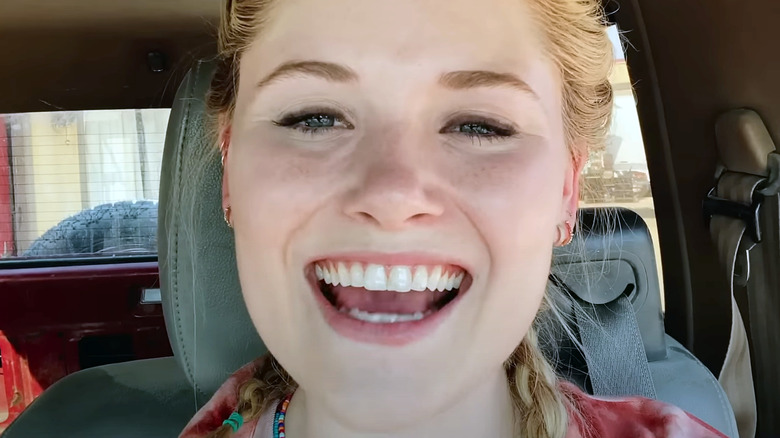The Strange Way Fall 'Faked' Its Way To A PG-13 Rating
The movie business isn't only about entertainment, of course; it's also about making money. So naturally, producers will do all they can to ensure their movie makes the most money possible. An R-rating could be a death sentence for reaching a wider audience and bringing in big bucks... unless your movie is "Deadpool," of course.
That was the predicament facing the new movie "Fall," which will hit theaters on August 12. "Shazam!" star Grace Caroline Currey and "Marvel's Runaways" star Virginia Gardner appear in the film as best friends Becky and Hunter. After Becky's husband dies in a rock-climbing accident, Hunter convinces Becky to re-embrace her love of climbing by attacking a 2,000-foot-tall radio tower in the middle of nowhere. Of course, everything goes wrong as the old tower falls apart, and the two end up stranded without a way to get down. It's "Open Water" in the sky.
From what we can see in the trailer, the low-budget indie thriller doesn't contain any sex scenes or explicit violence. However, it would seem that the film was still under the threat of an R-rating. Why? Given the intense situation of climbing a rickety tower and getting stuck in the sky, you can imagine there are lots of F-bombs in the script. That's all it takes for a higher rating. According to Variety, the film's mere $3 million budget did not allow any time or money for reshoots. What was the producing team to do to not suffer the fate of an R-rating?
The producers of Fall used deepfake-style technology
You may recall when "Hamilton" came to Disney+ in July 2020, the producers had to bleep out two of the only three F-bombs in the show. According to MPAA rules, "More than one such expletive requires an R rating, as must even one of those words used in a sexual context." The script for "Fall," by comparison, contained more than 30 such expletives. That's a lot of changing to do, without any reshoots to help fill time.
To fix it, director Scott Mann employed the services of his own company, Flawless, which he founded in 2021, per Variety. The company created a new artificial-intelligence software called TrueSync, which attempts to make dubbing movies into other languages smoother and more authentic by changing the visual mouth movements of the actors to match how they would speak in a foreign language. The "deepfake" aspect is chilling: while it's not completely flawless yet (despite the company name), one can see how it might be in the near future (deepfake is bad, mmkay). Gone are the days of hilariously bad dubbing, where they would often change the translated dialog to match the mouth movements onscreen, according to Time. Now with TrueSync, it looks a lot more like Tom Hanks' Forrest Gump is actually speaking Japanese.
With "Fall," Mann used TrueSync to change the many instances of the F-word into standards-acceptable alternatives, like "freaking." It worked, and the final film landed a PG-13 rating for "bloody images, intense peril, and strong language," per MovieFilm.Biz. Let the money-making commence.

